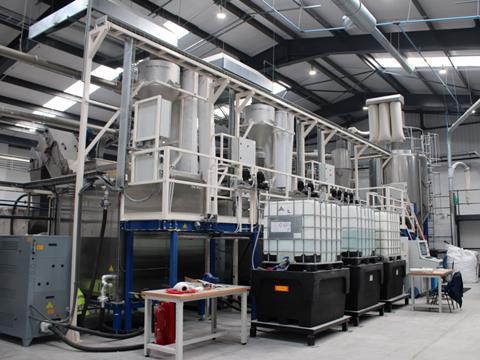Corplex has launched a new closed-loop recycling system that the company says can turn its polypropylene (PP) Correx® boards and AkyPak® packaging into new media.

At the centre of the project is Corplex’s 22,000 sq ft deinking facility, a multi-million-pound investment at its site in Gloucester in the UK. The initiative has been launched from a project designed to recycle outdoor signage mounted on the sides of London buses and is in partnership with Global Media and The Delta Group.
Traditionally, printed vinyl was sent to landfill, creating non-recyclable waste and a higher carbon footprint. Now, the closed-loop system allows for direct returns of the printed Correx® boards, post advertising campaign, back to Corplex’s Gloucester site. Here the boards are shredded, washed and recycled into clean, high whiteness PP flakes. They can then be re-extruded into new boards as well as into the AkyPak® packaging applications.
Corplex CEO Lucas van der Schalk said: “The demand for recycled PP material in packaging is high; the UK’s Plastic Packaging Tax is pushing the supply chain to use more recycled material. The level of investment we have put into our unique deinking facility is fully justified when you consider not only the results, but also the urgent need for sustainable products.
“Partnering with Global and The Delta Group demonstrates how collaboration can make a huge difference. Following what is a world first for printed PP board recycling, we also believe it is a fantastic opportunity for packaging.”
Corplex’s mechanical deinking system is driving force behind this project; one that reportedly fully closes the loop while delivering significant CO2 savings. The process is described as reducing carbon emissions by 500 tonnes annually and cutting the footprint by 80%.
Corplex is working with partners across several packaging applications, which will ensure that its AkyPak® packaging and containers are captured within a closed-loop system. Here, the process mirrors the outdoor media project, with returns being shredded, washed and recycled into new Correx® sheets.
Lucas van der Schalk added: “The shift toward reusable, recyclable substrates is no longer a matter of feasibility but of adoption. When combined with high-efficiency deinking, polypropylene offers the clearest path to circularity in printed signage, packaging and many other applications.”
In the summer, Veolia announced that it was investing £70 million (€81,227,650) into a closed-loop, tray-to-tray PET recycling facility – anticipated to process 80,000 tonnes of mixed plastics annually and result in new, food-grade packaging.
In other news, PET recycler Enviroo and plastics recycling authority RECOUP announced a ‘comprehensive validation’ of the PET recycling market and plans to build a PET plastic recycling plant in the North West of England.














No comments yet